What Vegetables Can Dogs Eat?
What vegetables can dogs eat? Can dogs eat tomatoes, celery, cucumbers, corn and other vegetables? This is a question — like “can dogs eat apples, grapes, strawberries and other fruits?” — that I’ve often asked myself while strolling through the local farmers’ market or the produce section of the grocery store. Here at Dogster, let’s answer the question, “What vegetables can dogs eat?” by looking at the dos and don’ts for a few common vegetables:
1. Can dogs eat tomatoes?
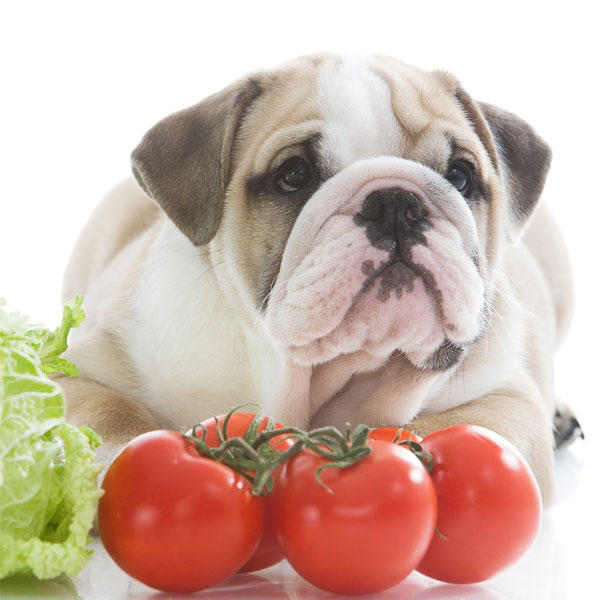
Are tomatoes safe for dogs to eat? The answer is it’s complicated. Photography by Tatiana Katsai / Shutterstock.
Are tomatoes safe for dogs to eat? Sort of — and be careful. Large quantities of tomato should not be fed to dogs; ingested in great enough volumes, naturally occurring chemicals in the fruit can cause heart and nervous system problems.
However, this may cause some consternation, but in small quantities, the tomato fruit is okay for dogs. There has long been debate on dogs and tomatoes, but the worst a little bit of ripe tomato will do to a dog is cause some stomach upset.
The green parts of the tomato plant — the vine, leaves, stems and unripe fruit — are another matter altogether. Solanine is a chemical found in high concentrations in these parts. One of the tomato’s natural defenses, solanine is found throughout the nightshade family, including the tomato and potato. If you have tomatoes in your garden, you’re better off keeping the dog out.
2. Can dogs eat carrots?
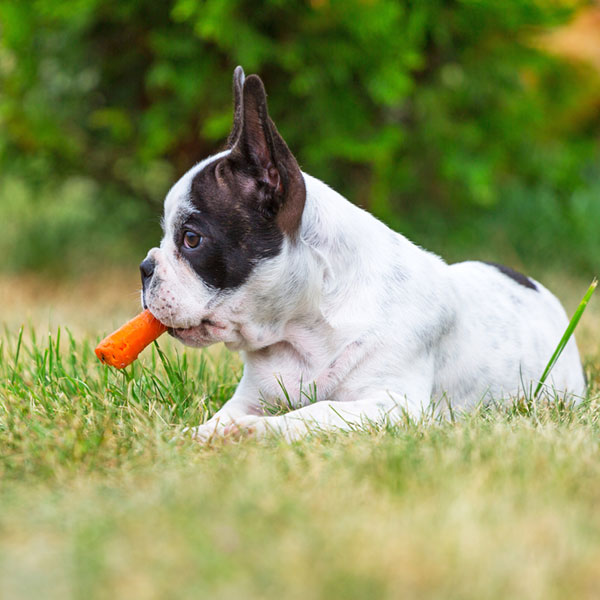
Can dogs eat carrots?
Another common question dog parents have when thinking, “What vegetables can dogs eat?” concerns carrots. Your dog is safe with carrots, preferably cut up into smaller sticks or pieces that they can easily chew on.
3. Can dogs eat celery?
Interestingly enough, too much celery can cause dogs to urinate a great deal more than usual. But cut into small, chewable, digestible pieces — with the leaves removed— celery is okay for dogs in limited amounts.
Can dogs eat cucumbers?
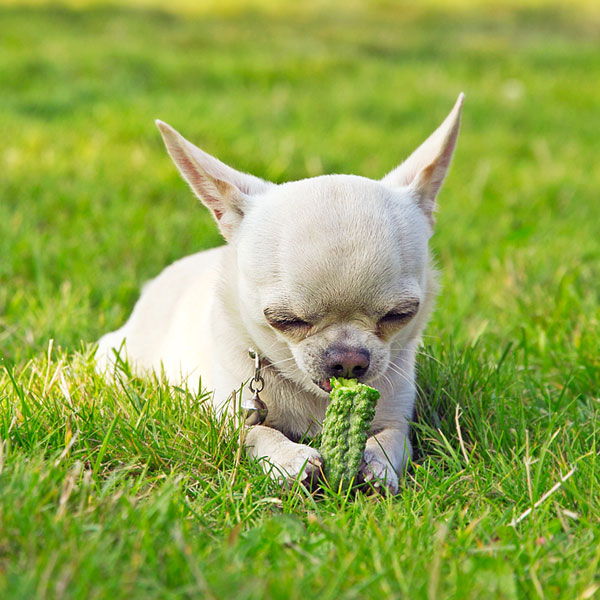
Cucumbers are safe for dogs to eat. Look at this tiny gentleman gnawing on one! Photography by Little Moon / Shutterstock.
Another common vegetable to consider when thinking, “What vegetables can dogs eat?” is cucumbers. Especially if it’s peeled and given in chewable portions, cucumber is fine for dogs. As for pickles, the excess of vinegar and salt in pickles may be a bit more than your dog’s digestive system would appreciate.
4. Can dogs eat avocado?
Parts of the avocado tree and fruit contain a natural antifungal agent called persin, which is hazardous to dogs when consumed in great enough quantities. Needless to say the pit or seed of an avocado should not be given to a dog; aside from the natural toxins it contains, it can cause intestinal blockages. However, it’s safe for dogs to eat the green, fruit part of an avocado in small amounts.
5. Can dogs eat corn? Can dogs eat popcorn?
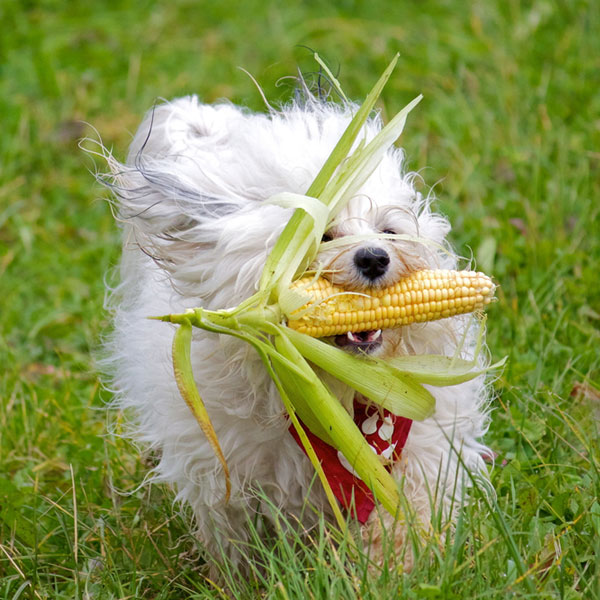
Is corn okay for dogs to eat? What about popcorn for dogs?Photography by Bildagentur Zoonar GmbH / Shutterstock.
While the kernels of ripe corn are okay for dogs, the cob itself is a bit more dangerous. Ingested by a dog, even small pieces of corn cob can tear at and cause damage to the walls of a dog’s digestive tract. As for popcorn, take common-sense precautions. Plain and unadorned — that is to say, air popped, with neither salt nor butter — popcorn can be a nice treat for a dog. Bottom line: served in an appropriate manner, both corn and popcorn are safe for dogs to eat.
6. Can dogs eat broccoli?
Broccoli is another staple to consider when questioning, “What vegetables can dogs eat?” In very small amounts, the head of broccoli should not present any issues for your dog, but only in very small amounts. Received wisdom across multiple sources suggests that if it accounts for no more than five to 10 percent of a dog’s daily food intake, broccoli is all right for dogs. More than that and you can have a dog with a severely upset stomach. Therefore, broccoli is another yes and no affair; use your best judgement.
7. Can dogs eat potatoes? Can dogs eat sweet potatoes?
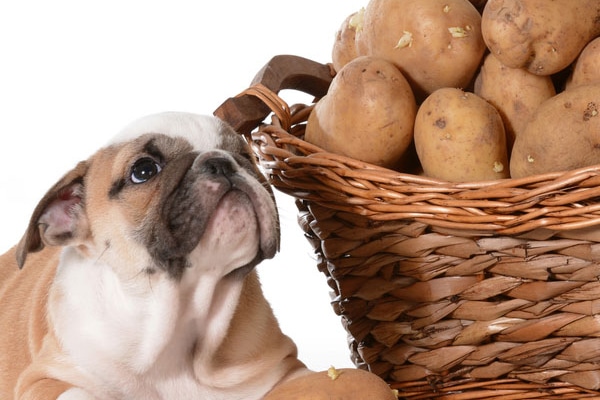
Are potatoes safe for dogs to eat? Photography by
As with tomatoes, the leaves, stems and unripened fruit of potato plants contain solanine, which is toxic to dogs. Even ripe, a potato is not a good idea for dog nutrition. Peeled, and then cooked or mashed, on the other hand, your dog may enjoy a bit of potato. Observe the same caution you would with popcorn, and make sure there’s no salt or butter present. The same — no additives — goes for sweet potatoes, even though they are fundamentally different plants.
8. Can dogs eat onions?
Eaten by dogs, onions cause red blood cells to break down, a condition called hemolytic anemia. The breakdown of red blood cells means that the dog gets less oxygen. The more concentrated the onion, the more quickly it works.
Can dogs eat garlic? Your dog should avoid garlic as well for the same reason. If you’re like me and enjoy onion in your guacamole, it’s even more a reason to keep that avocado dip you find delicious well away from your dog. The answer here is definitely no.
9. Can dogs eat asparagus?
Asparagus is another household veggie that crops up when thinking, “What vegetables can dogs eat?” Well, as long as the amount is small and reasonable, asparagus presents no problems for dogs.
10. Can dogs eat green beans?
Green beans, in moderation, are fine for dogs. Raw or cooked, as long as you avoid salt and other additives, your dog may enjoy some green beans.
11. Can dogs eat peas?
If you dog has a taste for peas, then by all means, let them have a few! When it comes to, “What vegetables can dogs eat?” this one is a yes.
In 1816, Richard Lawrence wrote that “parsnips, carrots, cabbages, and, indeed all vegetable matter, will feed dogs sufficiently well for the purposes of their existence.” Fortunately, we know better now to steer our dogs clear of avocado and onion, as well as to keep them from many unripened vegetable plants in the garden.
Tell us: What kinds of vegetables do your dogs seem to enjoy? Have you ever offered a carrot stick to your dog, only to be met with a blank stare? Let us know about your dog’s experiences with veggies in the comments!
This piece was originally published on July 20, 2018.
Thumbnail: Photography by Helen Hotson / Shutterstock.
Learn more about what dogs can — and can’t eat — on Dogster.com:
Plus, some fruits and vegetables are healthier for humans than others. Find out which fruits and vegetables you should eat for weight loss— and which you should avoid — here >>

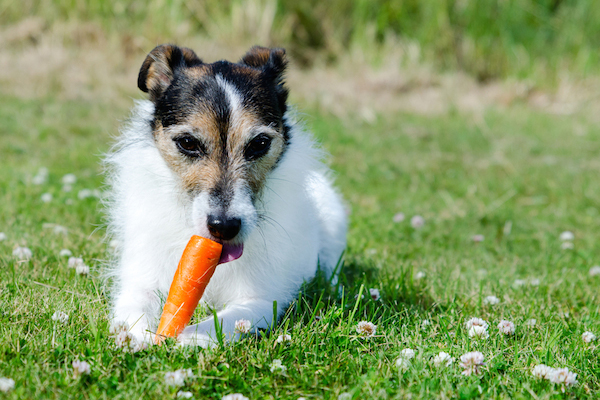


depakote schizophrenia